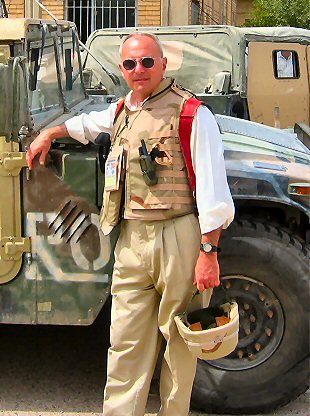Rich Galen and Barak Goodman are our guests this week.
Show produced by Katherine Caperton
Original Air Date: January 28, 2011 on SiriusXM Satellite Radio “POTUS” Channel 124
Listen to the show by clicking on the bar above.
Show also available for download on Apple iTunes by clicking here.
Fourteen years ago this month, about a month after I left the White House as a member of the Clinton Administration, Washington lit up with news, which broke first on the Drudge Report, about President Clinton’s affair with Monica Lewinsky. The nation’s capital, and the Presidency itself, was forever changed, not so much by the President’s conduct with Monica, but by the media and internet-fueled maelstrom that ensued, and the way that the Clinton White House fought against the onslaught.
In the last three months, I’ve been thinking a lot about January, 1998. First, because Newt Gingrich, who was such an integral character in that 1998 drama and the years that led up to it, stormed so forcefully back on the scene in 2011 and 2012 with his frequent rises and falls in popular support. And second, because I knew PBS was on the verge of debuting its newest installment in its singularly evocative “American Experience” series of documentaries, this one entitled, simply CLINTON. More on that in a minute.
Speaker Gingrich, who dueled so hotly with President Clinton during his four years as Speaker from 1995 to 1999, might well claim to be victimized in recent months by the same kind of organized assault aimed at President Clinton during 1998. That kind of broadside, like it or not, is the combat that controversial public figures seeking higher office are now forced to endure, deflecting as best they can the rapid-fire incoming barrage fueled by tactics developed and honed during the impeachment drama of 1998 and 1999.
* * *
What drives a polarizing figure like Newton Leroy Gingrich, with all of the baggage and negatives attached to his biography, to think that he can prevail over other Republican rivals and win the GOP nomination? And if he were ever to get that far, how could he possibly convince a sufficient quantity of swing voters in the battleground states that he would be a better steward of the Presidency than the current occupant of the Oval Office?
The current White House is rightly conducting itself as if Barack Obama is vulnerable next fall to losing those crucial swing voters, but I have never felt that he would lose them to Newt Gingrich, and still don’t.
I, like many, readily admit that I’ve been surprised by Newt’s performance thus far. I have a theory, that would be borne out by Mitt Romney’s ultimate nomination, that the candidates with the best mix of “presidential” bearing, likeability and youthful, energetic persona generally have the best shot to carry their party into the White House every four years. That theory largely held up in Clinton v. Bush (1992), Clinton v. Dole (1996), Bush v. Gore (2000), Bush v. Kerry (2004), Obama v. McCain (2008). Again, winning candidates don’t have to be completely Presidential, likeable, youthful and energetic on the campaign trail, but it takes a certain alchemy of all of those attributes to win.

Rich Galen
So I, like many, continue to be very amused by the character and narrative that is Newt Gingrich. To explore that further, we talked this week to an old friend, Rich Galen, who worked for Gingrich during his heyday as Speaker in the mid-1990’s and has as good a perspective as anyone about what drives the man.
Rich is a pioneer in his own right. Beyond his ongoing work as a GOP consultant and strategist, he took his radio training from a small station in Marietta, Ohio and converted it into Mullings, which he has steadfastly maintained in three-times-week columns since 1998. Rich was blogging before blogging was even a word, and continues to be one of the most closely followed Republican commentators in cyberspace.
Rich and I found ourselves cast together to help grow a nascent Internet startup, Speakout.com, in 1999 and 2000. With my “Wanderings” column that leaned to the left, I tried to be his foil to his right-leaning Mullings column as we worked together to bring balance to the Website. In truth, Rich has no foil — Wanderings is long gone but Mullings successfully endures to this day as a unique and always witty contribution to partisan discourse since his first dispatch via fax machines delivered to GOP staffers and interested media (and a good many Democrat) readers in the 1990’s.
Along the way, Rich has established his bona fides as a genuine patriot as well. After 9/11, when so many of us looked in the mirror and wondered how we, too, could aid in the nation’s response to the terrorist attack, Rich picked up the phone and called then White House adviser Karen Hughes and, in his words, “asked to be put in the game.” The call came in 2003 from Karl Rove, and Rich was promptly dispatched to Iraq for what he thought was going to be a six-week assignment that turned into a six-month tour. In our conversation with Rich, he recalls, in a way you must hear, his interaction with young U.S. Marines returning from patrol who wanted nothing more to connect with their loved ones on Christmas Day.
* * *
 I am a huge fan of the American Experience series because of the way that these films gather together both known and rare archival material and mix it with cunning narration and music to bring history back to life. Watching the Reagan episode of the series, for example, helped me learn to be a better advance man.
I am a huge fan of the American Experience series because of the way that these films gather together both known and rare archival material and mix it with cunning narration and music to bring history back to life. Watching the Reagan episode of the series, for example, helped me learn to be a better advance man.
Having now watched all four hours of Barak Goodman’s new CLINTON installment of the series, I can attest that it is an exemplary example of research, editing, scoring and visual storytelling. But I confess to being conflicted, as I know many of my colleagues from the Clinton years will, with how much of the film (nearly the entire second half) is devoted to recreating the impeachment saga, as if little else happened, for better or worse, between January 1998 and January 2001.
Our conversation with Barak Goodman is vintage Polioptics. Goodman’s film premieres on a PBS station near you, spanning two nights, February 20 and 21.
[youtube]SrPzxultvWg[/youtube]
First, my hats off to Goodman for the first half of the documentary, titled “The Comeback Kid,” which is a feast for the senses about the events and influences that shaped young Bill Clinton growing up in Hope and Hot Springs, Arkansas and the journey that took him to Georgetown, Yale, Oxford and back to Little Rock to run for Congress and then win races for Attorney General, Governor and President of the United States.

Barak Goodman
There are insights, photos and video, that I’m sure have been seldom seen, which give much greater nuance to young Clinton than earlier retellings of his upbringing and will surprise even those who worked for him for many years. And for anyone who worked on, or followed closely, the 1992 campaign, it’s a thrill ride to watch again highlights of the “The Last Dog Dies Speech” in New Hampshire, the clasping of hands between Clinton and Gore to the tune of “Don’t Stop Thinking About Tomorrow” and the round-the-clock campaigning in September, October and November.
There have been many biographies of Clinton and certainly his own memoir — My Life — which touch on many of these formative experiences in words on a page, but in the hands of a skilled documentarian like Goodman and a staff of researchers and editors, the film version does in two hours of a motion picture what hundreds of pages simply cannot do.
But then, there’s the second half — “The Survivor” — which shares the name of John Harris’s Clinton biography (yes, John is a key interlocutor in the film) and covers a lot of the same ground. Viewers are reunited, whether they like it or not, with Jim and Susan McDougal, Paula Jones and, of course, Monica Lewinsky and Linda Tripp. Also prominent are the other peripheral players in the saga, like literary agent Lucianne Goldberg and reporter Michael Isikoff, who pursued the story doggedly for Newsweek. And there’s a striking cameo by Ken Starr, sitting for an interview with Goodman as if stepping out of a time warp. It’s 1998 all over again, and they want their side of the story told.
 Do we need it? You have to question whether the “American Experience,” which is made once for each President and must stand forever as the documentary record put forth by Public Television, might have used less footage from the Lewinsky saga and explored other facets of the Clinton Presidency that, a decade removed from it, deserve closer examination. To his credit, Goodman painstakingly squeezes in as much balance to the narrative as possible including, as an example, the key passages of the speech that then-Sen. Dale Bumpers made from the Senate floor that encapsulated the view of many about what our last Constitutional Crisis was all about.
Do we need it? You have to question whether the “American Experience,” which is made once for each President and must stand forever as the documentary record put forth by Public Television, might have used less footage from the Lewinsky saga and explored other facets of the Clinton Presidency that, a decade removed from it, deserve closer examination. To his credit, Goodman painstakingly squeezes in as much balance to the narrative as possible including, as an example, the key passages of the speech that then-Sen. Dale Bumpers made from the Senate floor that encapsulated the view of many about what our last Constitutional Crisis was all about.
So much time has passed since 1998-1999. The unprecedented vitriol that consumed those years, with Gingrich and Clinton at the center, which seemed so new at the time, is now commonplace. We tend to forget, but are reminded in Barak Goodman’s film that uses extensive, seldom-seen-before shots by White House photographer Bob McNeeley, that Clinton and Gingrich spent many hours with their sleeves rolled up in face-to-face negotiation with one another. Even as the new Newt Gingrich returns to the stage for one more revival of his old show, its useful to remember how he and Clinton did manage to work together before the Presidency and the Speakership encountered their well-known road blocks en route to finally crossing “the Bridge to the 21st Century.”
 Commentators today spend a lot of airtime reflecting on the (perhaps overly
Commentators today spend a lot of airtime reflecting on the (perhaps overly nostalgic) relationship between Ronald Reagan and Tip O’Neill. The Clinton-Gingrich parry was a precursor to the relationship between George W. Bush and Nancy Pelosi, and Barack Obama and John Boehner after that. Watching them over the past few years, you get a sense that Obama and Beohner, deep down, have wanted to establish a working rapport to strengthen the state of the Union, but the times are very different and, much as they try, Obama is not yet Reagan, and Beohner is not yet O’Neill.
nostalgic) relationship between Ronald Reagan and Tip O’Neill. The Clinton-Gingrich parry was a precursor to the relationship between George W. Bush and Nancy Pelosi, and Barack Obama and John Boehner after that. Watching them over the past few years, you get a sense that Obama and Beohner, deep down, have wanted to establish a working rapport to strengthen the state of the Union, but the times are very different and, much as they try, Obama is not yet Reagan, and Beohner is not yet O’Neill.
For all the ambivalence viewers are likely to have about revisiting the second half of the Clinton Presidency in lurid detail, the film is very much worth watching for the appearance of so many key players from that era and the perspective they bring to it more than a decade removed from the action. Viewers will enjoy hearing from people like Don Baer, the late Tony Blankley, Max Brantley, David Maraniss, Dee Dee Myers, Mark Penn (you can see the details of his polling data woven into the narrative about Clinton’s 1995-1996 comeback from the 1994 mid-term elections), Mike McCurry, Trent Lott, Harold Ickes, Carolyn Staley, Harry Thomason and Joe Klein, who wraps the film on a high note. The clinical tone that Ken Starr and Dick Morris bring to the film, so long after they dominated center stage, makes for very interesting viewing.
Not interviewed are Bill and Hillary Clinton, and a lot of people may complain about that. The Clinton Library and the Clinton Foundation provided extensive archival material for the film, and many of Clinton’s friends and colleagues cooperated, contributed footage and agreed to be interviewed as well.
But as Barak Goodman points out, this is a documentary, not a memoir. And besides, as the next acts in their biographies have proven over the years 2001 to the present, Bill and Hillary have moved on, very successfully.


Leave a Reply